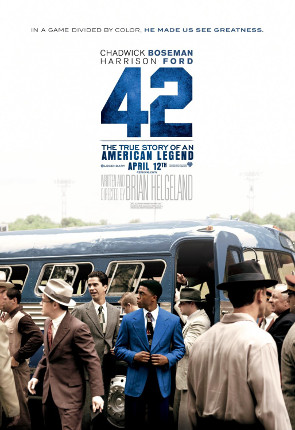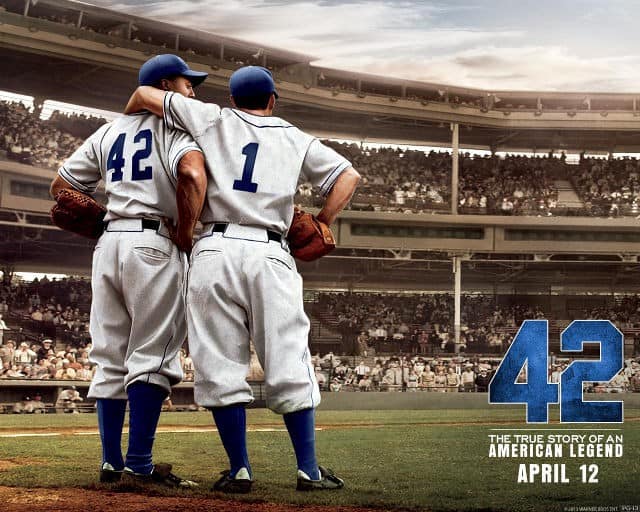
Dodger Teammates
I saw the film “42” this weekend. It’s a nicely made biopic about Jackie Robinson’s historical rookie season as the first black player to take the field in major league baseball. While Robinson’s story is a remarkable one, I have to say that for most of the film I felt like I’d seen it before – the underdog-victory story (Hoosiers, Rudy, etc.), the sport-leads-to-social-change story (A League of Their Own), the play-together-to-stay-together story (Remember the Titans).
I should say that I felt this way in every moment but one – the shower scene. Trust me; it’s not what you think.
***
Early in the film a young black journalist tries to help Robinson by giving him some advice. Robinson has stubbornly refused to answer any of his questions, and the reporter asks him to consider how these are just the first of many tough questions to come, and how they aren’t going to get any easier. He pleads with him. “You know how you’d like to see the pitch come slowly toward you,” he says. “Well, maybe you’d like to see these questions come slowly too.”
Later in the film, after seemingly endless encounters with bigotry and hatred, Jackie is exhausted and sits waiting to take a shower. A sympathetic teammate comes up to him and asks, “Why do you wait for the rest of us to finish before you shower?” Robinson responds that he doesn’t want to make anyone uncomfortable – something he does consistently and courageously on the field and in public. But I suppose a shower is another level of intimacy than a dugout. The well-intentioned teammate insists: “Take a shower with me,” he says.
It takes about half a beat before you pick up the coming homophobic comedic moment. The lanky pitcher is doing his awkward best to make the negro ball-player feel welcome. But during that half-beat (and sitting in the theatre it felt longer than that) before the comedy breaks in, I wondered. I wondered if this wasn’t going to be a comedic moment. I wondered if there was another tragedy of exclusion and derision about to be revealed.
I thought of a story I’ve told here before, a story of a person asking to be loved. It’s a story about the risk-taking moment in which you allow someone to notice you as different. As I watched this scene I wondered if we were being invited to witness one man’s struggle to find himself embraced in his color and another man’s struggle to find himself embraced in his sexuality.
You could see the homo-erotic moment coming from a mile away, like a hanging curveball out over the plate. It arrived just slow enough to let the audience decide what to do with it. The crowd I was with decided to laugh. One man asks another to take a shower with him and it was quickly interpreted as something to laugh at.
But the characters didn’t laugh as quickly as the audience did, which gave me time to wonder if the filmmaker intentionally left the moment in our hands. Is this funny? Is this tragic? Is it another moment of discrimination yet to be overcome? Is it our moment? In any case, it felt to me like a very slow pitch and the audience’s quick swing pulled it hard into foul territory.
In a different crowd, or in another moment in history, will it play the same way? I don’t know. But I wondered – having seen the story before – if this was meant to be a comedic moment or a bridge between two periods. It would have been bold to raise homosexuality explicitly in this context. Maybe it would have been an anachronistic distraction from the remarkable story of Jackie Robinson’s life. But if the choice was made to let it speak in subtlety, in a moment’s pause, then that was a brilliant point in an otherwise predictable film.
***
Eventually even Jackie Robinson laughs. The lanky teammate stammers, “Take a shower with me… uh take a shower… I mean take a shower with us… ahem… you know… with the team.” Robinson chuckles with a warm smile, breaking the ice, and frees the nervous white-boy from himself.
“Stop,” he says. “Just stop.” And then, in a dramatic portrayal of the intimacy at stake in the very heart of hateful divisions like this, the film turns from comedy to poignancy as Jackie steps nakedly into the shower with his team. One teammate turns to leave in frustration and disgust. By this point the audience had certainly stopped laughing.
The film leaves it for us to decide if and when to allow comedy into what could easily be a moment that hits much closer to home. When someone asks, in word or deed, to find themselves included, welcomed, embraced, and loved, when that slow curveball hangs out over the plate, we’re each given a moment to decide what to do with the pitch. It’s our turn at the plate. We can take it or we can hit the damn thing straight out of the park.
I’m not sure I have the courage to do what Jackie Robinson does in this film or what he did in real life. I’m not sure I have the strength to answer every act of hate in freedom and love. But I’m sure to have my chance at the plate. I know time and circumstance will send many curveballs my way. I suppose my prayer is simply this: as Jackie Robinson says at one point in the film, ”Just give me something to hit.”


